Review| Three Billboards Outside Ebbing, Missouri & the Backroads to Justice
Three monuments stand erect in a staggered row along a road that gets little traffic in the town of Ebbing, Missouri; justice, here, like any other place is relegated to the backroads of peoples’ consciousness and not its central thoroughfares. Their faces are covered in red paint which screams from the earth in protest of another tendril of blood that runs down from Abel. A young girl is raped as she dies outside of the town. Justice has not been done. Her mother, Mildred (played with seething anger and lament by Frances McDormand), becomes the incarnated “hand” that appears to King Belshazzar in the Biblical book of Daniel, calling the chief to justice.
“Raped While Dying”
“And Still No Arrests?”
“How come, Chief Willoughby?”
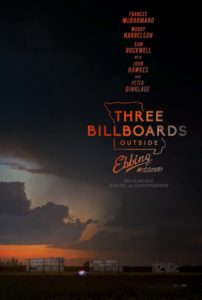 The inscriptions in stark white might as well have been those on the King’s wall. Their meaning is a call to justice and a promise for Chief Willoughby (Woody Harrelson) and all of those who are culpable by association with him.
The inscriptions in stark white might as well have been those on the King’s wall. Their meaning is a call to justice and a promise for Chief Willoughby (Woody Harrelson) and all of those who are culpable by association with him.
Three Billboards Outside Ebbing, Missouri continues the reflections on justice, violence and pacifism that have laid at the heart of the films of director and playwright, Martin McDonagh. This, along with In Bruges and Seven Psychopaths, find an interplay of characters that deal with what the nature of righteous anger is supposed to look like. Is it violent or is it a seething peace? There is plenty of both contained in his most recent film. Three Billboards has the staging of a play, set with monologues, caricatures given humanity, and mechanical plot devices that move the story along. None of these things distract, however, from the emotional core of the film, centered on Mildred, as we learn what it means to protest injustice pointedly and with intention.
The film has come under some criticism for sidelining its black characters and their difficulties with police brutality in Ebbing as well as allowing a little person’s existence in the story in order to insult only. While I understand the critique, I think there is enough structure in the story to address these critiques though they may not be as blunt as some would like.
While watching the events of the film unfold, the story, alluded to above, of Daniel interpreting the “writing on the wall” to King Belshazzar in the fifth chapter of Daniel, creates a speculative framework in which the questions of justice, guilt and redemption can be culled. Daniel has this moment where he couches the writing’s condemnation of the king in the context of the one who came before him, his father, King Nebuchadnezzar. His father had allowed the power and authority that God gave him to go to his head and had been brought low. Yet Belshazzar knew all of this about his father and his royal history and yet fell into the same traps. The Lord’s patience is enduring, except for when it is not.
I. MENE.
“God has numbered your kingdom, and finished it…” (Daniel 5:26 NKJV)
 The billboards become Mildred’s protest of injustice. She is calling out the head of the town’s justice system: Chief Willoughby. Willoughby, by all accounts, seems like a fair man, a decent chief of police and someone who actually does care. Initially, Mildred’s attack feels mean-spirited and provocative. However, there is no such thing as a benevolent ruler within the ranks of a broken humanity. We start to see the cracks in Willoughby’s rule. He continually allows an openly racist cop, Dixon (played with aplomb by Sam Rockwell), continue to wreak havoc on the black residents of Ebbing. He has given up on finding the killer of Mildred’s daughter. He is subtly enraged by the chaos that has been brought to his town because of Mildred’s signs. He is still human with all the typical foibles in tow.
The billboards become Mildred’s protest of injustice. She is calling out the head of the town’s justice system: Chief Willoughby. Willoughby, by all accounts, seems like a fair man, a decent chief of police and someone who actually does care. Initially, Mildred’s attack feels mean-spirited and provocative. However, there is no such thing as a benevolent ruler within the ranks of a broken humanity. We start to see the cracks in Willoughby’s rule. He continually allows an openly racist cop, Dixon (played with aplomb by Sam Rockwell), continue to wreak havoc on the black residents of Ebbing. He has given up on finding the killer of Mildred’s daughter. He is subtly enraged by the chaos that has been brought to his town because of Mildred’s signs. He is still human with all the typical foibles in tow.
When asked why Willoughby was called out specifically, Mildred simply states that he is the one in charge, the legal head of the police force—the Biblical Adam of Ebbing, Missouri. His “kingdom” reigns and all issues of justice fall to him—and those under him—in his domain. Mildred’s rage towards injustice becomes the means by which his kingdom comes to an end. Its days are numbered and so are Willoughby’s as we come to find out during the film.
Thematically, Willoughby’s revealed fight with cancer and the character’s narrative fate become a type of judgment unto him. The hand, writing on the wall, is Mildred’s and the interpretation of her words become the spark that ignites the fire under the town. When all of the townspeople take Willoughby’s side and show animosity to her for publicly expressing her anger and cry for justice, they, too, become collectively tied to Willoughby’s judgment. They become part of his “club.”
II. TEKEL.
“You have been weighed in the balances, and found wanting…” (Daniel 5:27 NKJV)
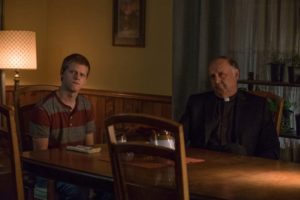 Justice in the Bible is at the hands of God, yet people often become instruments in his hands in order to enact justice in the world. He is always just and right in his judgment. Vengeance, however, is a fragile human attempt at justice. Driven by distorted and unfocused anger and pain, those who seek vengeance forget that they, too, are condemned and believe themselves to be like God, all knowing, all powerful and all good. Yet they aren’t and their “justice” begets more injustice. Mildred’s rage veers, at times, towards revenge. Yet it’s not her violent actions in the film that bring justice, but her initial lament and protest. Her violent actions only provoke the police force and the townspeople. Her billboards, her questions, are what truly show that Willoughby, Dixon and those who rail against her protest are found wanting. They have collectively turned a blind eye to the murdered and raped girl, they have turned a blind eye to those who have been subjugated to the edges of humanity in the town.
Justice in the Bible is at the hands of God, yet people often become instruments in his hands in order to enact justice in the world. He is always just and right in his judgment. Vengeance, however, is a fragile human attempt at justice. Driven by distorted and unfocused anger and pain, those who seek vengeance forget that they, too, are condemned and believe themselves to be like God, all knowing, all powerful and all good. Yet they aren’t and their “justice” begets more injustice. Mildred’s rage veers, at times, towards revenge. Yet it’s not her violent actions in the film that bring justice, but her initial lament and protest. Her violent actions only provoke the police force and the townspeople. Her billboards, her questions, are what truly show that Willoughby, Dixon and those who rail against her protest are found wanting. They have collectively turned a blind eye to the murdered and raped girl, they have turned a blind eye to those who have been subjugated to the edges of humanity in the town.
Mildred sees, clearly, the systemic sins that thread throughout the town. She sees the way the police harass and beat the black people in her town. She experiences the threat of violence and abuse towards women by men in the town. These are not just individuals, but sinful cultures that have been made normalized. She breaks into a rant towards the Catholic priest—who has come to give comfort to her son—by comparing the Crips and the Bloods to Catholic priests. While some members of the priesthood (or gangs) may not be doing harm to others, another member’s wrongdoing convicts all in the priesthood (or gangs). One cannot be a part of a club and remain untainted by the sins of the club.
By targeting Chief Willoughby, Mildred aimed to call into question all who identify with his club. Justice is never a matter of individuals, but a collective act. When justice is not served, the whole collective comes into question. Her monuments of protest upend the town and they are forced to reckon with the blood that trickles down their hands. By the end of the film, it ends up being those who don’t identify with the club that find their own lament and injustice addressed.
III. PERES.
“Your kingdom has been divided, and given to the Medes and Persians.” (Daniel 5:28 NKJV)
 By the end of the film, there is justice being had despite all the human anger and vengeance which only serves to bring more injustice. Willoughby’s “kingdom” has been brought down and Dixon is cast out of the police force. In their place, we see Abercrombie—a black police chief—placed in the office of Willoughby. We see the only truly good people in town are the black characters and a little person (Peter Dinklage), all of whom are considered outsiders. Even Mildred, through flashbacks, and through her actions in the film keep her from having clean hands in all the chaos that takes place. The town and its halls of justice have been metaphorically—and in some ways—literally divided and given to its “enemies”: those it had slandered, beaten, made fun of, kept from places of power, etc.
By the end of the film, there is justice being had despite all the human anger and vengeance which only serves to bring more injustice. Willoughby’s “kingdom” has been brought down and Dixon is cast out of the police force. In their place, we see Abercrombie—a black police chief—placed in the office of Willoughby. We see the only truly good people in town are the black characters and a little person (Peter Dinklage), all of whom are considered outsiders. Even Mildred, through flashbacks, and through her actions in the film keep her from having clean hands in all the chaos that takes place. The town and its halls of justice have been metaphorically—and in some ways—literally divided and given to its “enemies”: those it had slandered, beaten, made fun of, kept from places of power, etc.
Power was returned to those who had none at the cost of those who misused the power they had been given by the good graces of God. This, it seems, becomes the central justice that is handed down through the course of the story. The killer of Mildred’s daughter is still a shadow beyond their grasp. Dixon even begins to see how his racism is actually not beneficial to him or those whom he hates. He is shown grace in a moment where judgment was expected by one whom he physically hurt and nearly killed. His redemption story is nowhere near tidy. Much feels like it is redemption by means of utilitarian benefit. He is still a bad cop, but we start to see the most caricatured character in the whole film become more human, deeply flawed still, but with a hope for change. Even Chief Willoughby, before he bows out, is humbled by Mildred’s actions even to the point of paying for another month of the advertisements.
Yet those monuments of protest with the words written on their walls remain, a reminder that justice rolls on, may it be peaceful or violent. It will come and it will leave no one unchanged. And if those words had not been spoken, justice would have continued to be relegated to the back roads of Ebbing’s consciousness and, by extension, our own.
“MENE, MENE, TEKEL, UPHARSIN.” (Daniel 5:25 NKJV)


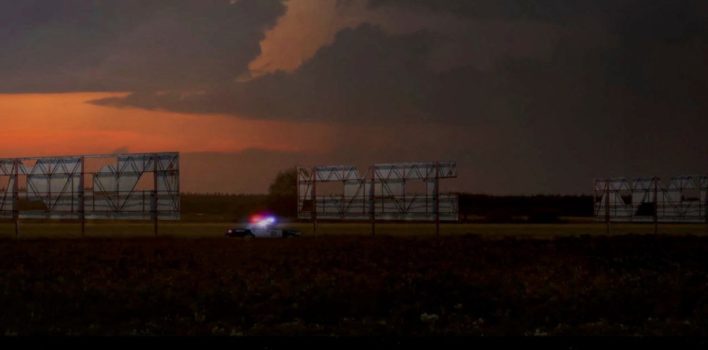
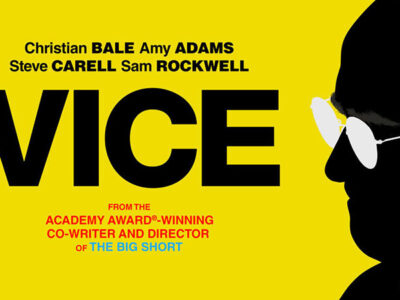
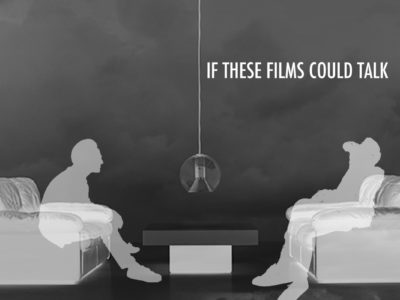
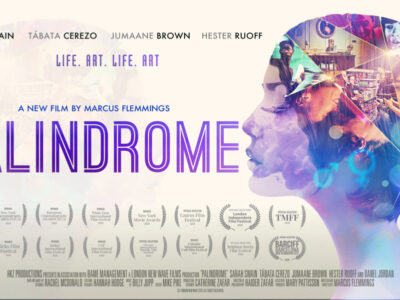



Pingback: #157 – Three Billboards Outside Ebbing, Missouri and Righteous Anger | Reel World Theology
Pingback: Staff 2017 Top Ten| Blake Collier | Reel World Theology